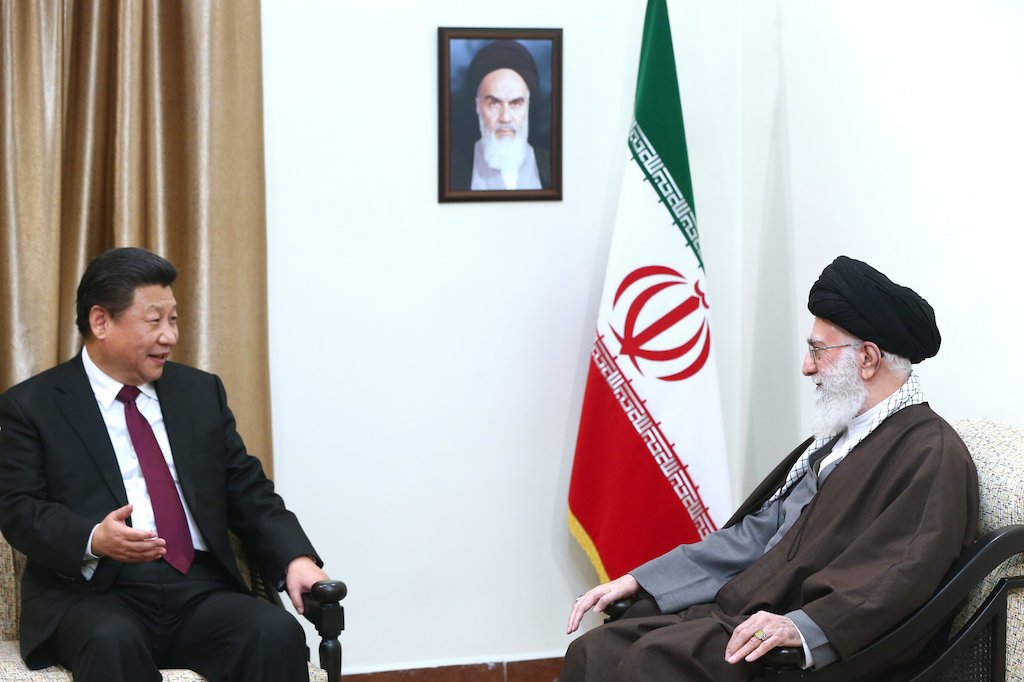Iran, China Sign Controversial 25-Year ‘Strategic Cooperation Pact’

Xi Jinping, the Paramount leader of China (CCP General Secretary) and his entourage met with Ali Khamenei, the Supreme Leader of Iran on Jan. 23, 2016. Photo via official website of Ali Khamenei, Supreme leader of Iran.
This article was originally published March 27, 2021, by Radio Free Europe/Radio Liberty.
Iran and China signed a controversial long-term bilateral deal during a ceremony in Tehran on March 27.
The details of the agreement have not been disclosed, but it is believed to include Chinese investments in Iran’s energy and infrastructure sectors.
China is Iran’s top trading partner and a key market for Iranian crude exports, which have been severely curtailed by U.S. sanctions.
The deal was signed by Iranian Foreign Minister Mohammad Javad Zarif and his Chinese counterpart, Wang Yi, who arrived in Tehran a day earlier.
State television described the agreement as a “25-year strategic cooperation pact.”
Iranian Foreign Ministry spokesperson Said Khatibzadeh said earlier on March 27 that the pact includes “political, strategic, and economic” components.
The deal also includes increased military and security cooperation between the two countries, according to a leaked draft of the deal.
Iranian officials have said that the pact was proposed in a January 2016 trip to Iran by Chinese President Xi Jinping.
Iranian Supreme Leader Ayatollah Ali Khamenei has publicly backed the deal.
Iranians have accused officials of hiding details of the deal amid fears that Tehran may be giving too much away to Beijing.
Iran has in recent years increasingly reached out to China in the face of growing U.S. pressure to isolate Tehran.
The United States unilaterally pulled out of a 2015 nuclear deal between Tehran and world powers in 2018 under former President Donald Trump.
Trump pursued a policy of “maximum pressure” on Tehran over its nuclear and missile programs, as well as its support for regional proxies.
The deal was meant to provide relief for Iran from international sanctions in exchange for limitations on its nuclear program, which Iran says is strictly for civilian energy purposes.
U.S. President Joe Biden has signaled his readiness to revive the deal.
Copyright (c)2021 RFE/RL, Inc. Reprinted with the permission of Radio Free Europe/Radio Liberty, 1201 Connecticut Ave NW, Ste 400, Washington DC 20036.

Coffee or Die is Black Rifle Coffee Company’s online lifestyle magazine. Launched in June 2018, the magazine covers a variety of topics that generally focus on the people, places, or things that are interesting, entertaining, or informative to America’s coffee drinkers — often going to dangerous or austere locations to report those stories.
BRCC and Bad Moon Print Press team up for an exclusive, limited-edition T-shirt design!
BRCC partners with Team Room Design for an exclusive T-shirt release!
Thirty Seconds Out has partnered with BRCC for an exclusive shirt design invoking the God of Winter.
Lucas O'Hara of Grizzly Forge has teamed up with BRCC for a badass, exclusive Shirt Club T-shirt design featuring his most popular knife and tiomahawk.
Coffee or Die sits down with one of the graphic designers behind Black Rifle Coffee's signature look and vibe.
Biden will award the Medal of Honor to a Vietnam War Army helicopter pilot who risked his life to save a reconnaissance team from almost certain death.
Ever wonder how much Jack Mandaville would f*ck sh*t up if he went back in time? The American Revolution didn't even see him coming.
A nearly 200-year-old West Point time capsule that at first appeared to yield little more than dust contains hidden treasure, the US Military Academy said.












